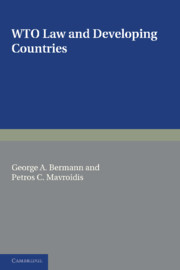Book contents
- Frontmatter
- Contents
- Contributors
- Developing Countries in the WTO System
- 1 The Legal Status of Special and Differential Treatment Provisions under the WTO Agreements
- 2 Trade Preferences to Small Developing Countries and the Welfare Costs of Lost Multilateral Liberalization
- 3 China in the WTO 2006: “Law and Its Limitations” in the Context of TRIPS
- 4 Developing Countries in the WTO Services Negotiations: Doing Enough?
- 5 Developing Countries and the Protection of Intellectual Property Rights: Current Issues in the WTO
- 6 Participation of Developing Countries in the WTO – New Evidence Based on the 2003 Official Records
- 7 Developing Countries and GATT/WTO Dispute Settlement
- 8 Representing Developing Countries in WTO Dispute Settlement Proceedings
- 9 Compensation and Retaliation: A Developing Country's Perspective
- 10 A Preference for Development: The Law and Economics of GSP
- 11 The GSP Fallacy: A Critique of the Appellate Body's Ruling in the GSP Case on Legal, Economic, and Political/Systemic Grounds
- 12 Is the WTO Doing Enough for Developing Countries?
- Index
3 - China in the WTO 2006: “Law and Its Limitations” in the Context of TRIPS
Published online by Cambridge University Press: 04 August 2010
- Frontmatter
- Contents
- Contributors
- Developing Countries in the WTO System
- 1 The Legal Status of Special and Differential Treatment Provisions under the WTO Agreements
- 2 Trade Preferences to Small Developing Countries and the Welfare Costs of Lost Multilateral Liberalization
- 3 China in the WTO 2006: “Law and Its Limitations” in the Context of TRIPS
- 4 Developing Countries in the WTO Services Negotiations: Doing Enough?
- 5 Developing Countries and the Protection of Intellectual Property Rights: Current Issues in the WTO
- 6 Participation of Developing Countries in the WTO – New Evidence Based on the 2003 Official Records
- 7 Developing Countries and GATT/WTO Dispute Settlement
- 8 Representing Developing Countries in WTO Dispute Settlement Proceedings
- 9 Compensation and Retaliation: A Developing Country's Perspective
- 10 A Preference for Development: The Law and Economics of GSP
- 11 The GSP Fallacy: A Critique of the Appellate Body's Ruling in the GSP Case on Legal, Economic, and Political/Systemic Grounds
- 12 Is the WTO Doing Enough for Developing Countries?
- Index
Summary
Introduction
China's transition from a statist to market economy over the past 15 years and its successful establishment of globally competitive industry are unprecedented historical events. Although China's entry into the WTO is not responsible for that transformation, it has played an important role. Accession to the WTO was used by the government as a means not only to stabilize access to foreign markets and increase the attractiveness of China to foreign investors but also to reorient internal policies in a way that deemphasized a profound shift in government attitudes.
One of the main reasons why the Organization for Economic Cooperation and Development (OECD) encouraged China's entry into the WTO was to enhance China's external economic linkages, thereby moderating its potential political-military adventurism. So far, the premise that a China highly integrated into the global economy would encourage moderate Chinese political policies appears to have been a sound one. And, so far, informed predictions that China would act as a responsible Member of the WTO, as it has acted as a member in other international organizations, such as the United Nations and IMF, have also proven sound.
However, the law of unintended consequences is always at work, and the rate of China's growth and success in world markets may have been unanticipated. Developing countries that for many years had pressed in the WTO for an agreement to eliminate textile quotas found themselves seeking to re-impose restrictions in the face of highly efficient Chinese producers. China is absorbing a large and increasing share of the world's natural resources, including oil and minerals, and Chinese demand is adding to global price and availability pressures.
- Type
- Chapter
- Information
- WTO Law and Developing Countries , pp. 59 - 81Publisher: Cambridge University PressPrint publication year: 2007



